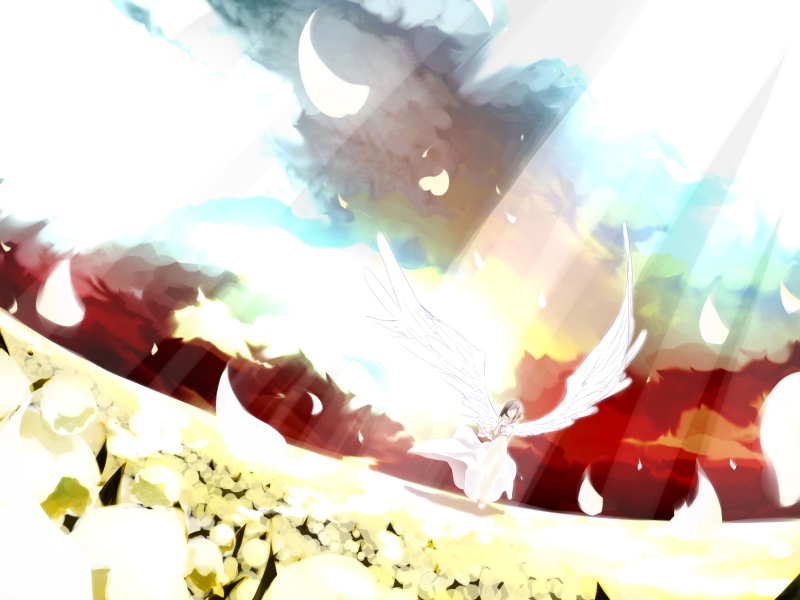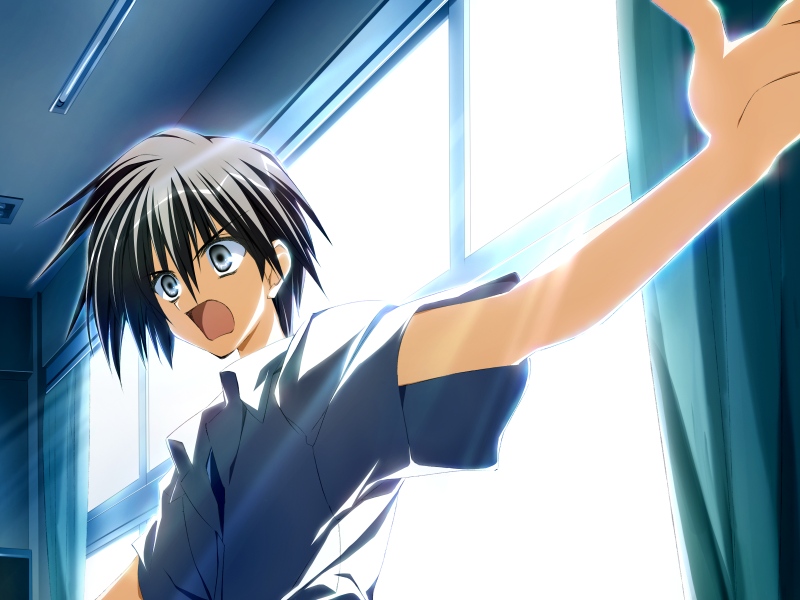
This summer, something unbelievably amazing has happened! Christmas arrived early and our lords and saviours from Frontwing blessed us all with the most amazing gift possible: An English translation of Subarashiki Hibi! I honestly couldn’t believe it at first. After all these years of waiting where every single fan translation has either been dropped or stalled eventually, as if that game was doomed to never see the light of the day on the western market, an unbelievable miracle happened and the world suddenly has become a much better place!
So, since you are reading this review here right now instead of already playing it, you’re probably still on the fence if Subahibi is truly fitting for your tastes. Well, personally I think that all doubt is misplaced here and you should just go ahead without hesitation and just read it, but if you are still curious as for why Subahibi is as famously highly acclaimed as it is, then simply continue reading this review here and I hope you will soon discover that very reason!
Subarashiki Hibi (generally abbreviated as “Subahibi”) is told throughout several chapters of varying lengths, structure, and different point of views. For the most part, they all cover the events that unfold in Tokyo during July 2012.
The first chapter, “Down the Rabit-Hole”, follows the point of view of the energetic and frivolous high school girl named Minakami Yuki,- a person of sarcastic nature that lives her everyday life without any doubt and hesitation. She is famous in school for doing whatever the hell she wants and spends most of her time in school skipping classes by spending her time reading literature on the rooftop. Yuki’s life is rather peaceful, until one day, she has a fateful encounter with a mysterious girl called Takashima Zakuro, a girl in another class in Yuki’s school that seems to have met Yuki before since she apparently knows Yuki very well, but Yuki herself is not able to remember if they ever even spoke before. The very next day, the news spread that Zakuro killed herself, and Yuki’s life is suddenly shattered into pieces.
Rumors in school are abuzz about the world ending in 2012, based on predictions from a Web site called the “Web Bot Project” ,- a network of crawlers designed to harness the “collective unconsciousness of humanity” to create precise and coherent predictions about the near future. Meanwhile, one of Yuki’s classmates,- a usually shy boy called Mamiya Takuji, seems to have gone mad all of sudden, rambling about being chosen by god himself to lead humanity to salvation from the apocalyptic event dubbed “the last sky” that is allegedely supposed to happen on the 20th of July, where the world itself is going to be destroyed and reborn.

The clock is ticking and things are heating up as continuously more and more people submit into madness and the amount of dead is steadily pilling up as the prophesied doomsday draws nearer and nearer. Will Yuki be able to get to the bottom of Mamiya Takuji, the Web Bot Project, and the Last Sky, or will the world truly end before she solves the mystery? This is the main plot of Subahibi.
While the initial plot alone will probably pique the interest of most people, -and it definitely is a more than intriguing storyline, so is the plot itself not what makes Subahibi the piece of art it is widely known and loved for. The thing that makes it so unique is mainly that every single chapter in this visual novel can either be categorized as in progressing the plot and thus revealing more of the overall mystery, or they are heavily based on philosophical theories and ideas which offer a prodigious amount of insight into the story’s true nature and message that it tries to convey. It does not attempt to explain every single detail, quite on the contrary, most of the plot is still surrounded by a mysterious mist of uncertainty til the very end, but instead, Subahibi insists that the reader finds all their answers to the questions that they may have themselves by emerging them into the ever so endless world of philosophy. This is all in order so that the reader will truly understand what Subahibi is really about. Also, while the amount of references to philosophy and even classic literature is so numerous that it is barely possible to list them all without exceeding the character limit of this review (just take a look!), Subahibi does not require any knowledge beforehand to fully experience the greatness it is, though it is very highly recommended to be atleast acquainted with the themes dealt with in the classical French play “Cyrano de Bergerac” (or alternative watch this old movie version here like I did), since Subahibi heavily resembles or parodies it’s themes and even directly quotes it repeatedly throughout the game.
“A drop of water fell in the distance.
The sound of a drop of water breaking somewhere in the distance.
That which is broken imparts its moisture upon the earth.
Only through breaking can it give its blessing.
Because once broken, the blessing is able to soak into the earth…”-Preface of “It’s My Own Invention”
Honestly, I’m having a really hard time to find just the right words in which to describe Subahibi since I’ve truly never experienced anything as amazing as this visual novel in my life. Without exaggerating, Subahibi is probably the one single piece of work that has changed the most how I look, deal and live with a lot of things and problems in my everday life nowadays, it definitely positively improved how I perceive the world in a large margin! I can simpy just not stop emphasizing how Subahibi is not just a visual novel, but it also is the key to change your outlook on life itself! It doesn’t straight up tell you what you should do, think or even what should be regarded as “right” or “wrong”, it outsources that matter to the reader themself and makes them find their own answers by leading the reader into the right direction through thought provoking questions and themes, all in order so that one finds their own truth oneself which you yourself are completely and absolutely satisfied with so that you can carry that truth with you throughout the rest of your life! Seriously, it helped me to much to appreciate my daily life a surprisingly tremendous amount more and it even builds up the foundations to continue a happy life in the future by making the reader deal with problematic questions that may seem unimportant for one’s everyday life at the first glance, but if you look deeper into that rabit-hole, you will discover that there always is more to one subject then one would expect. One of my favorite scenes has to be when Ayana, another girl in Yuki’s school, describes Mamiya Takuji what true immortality would feel like. It’s hard to put the effect it had onto me into words, so instead of describing that scene, I recommend to just straight up watch it here right now:
Just everything from the start to the end is simply perfect if you ask me,- well okay that is a lie, there have been some parts in this visual novel where the plot progressed painfully slow, especially the very beginning since the author really did feel the need to make sure that everyone, even the people who are not very experienced in philosophy matters like myself, will completely understand what the message is that he tries to tells us readers, but that just made me appreciate the visual novel even more since every single thing just felt so meaningful and important in it, which again also thaught me that everything in life has a meaning, even if it may seem rather unimportant at first. Nevertheless, I probably still have missed a stupendous amount of which the author tried to convey during my first playthrough, which just makes every future re-read even more exciting though since there are still countless things left to be discovered, all thanks to the vague nature of philosophical matters itself. Subahibi is not without reason regarded as kamige (Japanese internet slang for a highly appraised ergo godlike visual novel) and it definitely deserved it’s place as one of the highest regarded and rated visual novels out there.
In addition, the soundtrack itself already has to have come straight from god’s MP3 player itself since every single track just perfectly illustrates each chapter’s theme. The opening song alone has to be one of my most re-played songs ever since I discovered the track many years ago and throughout all these years, it build up such a grave desire inside of me to read this particular visual novel, it probably heavily amplified my overall joy of having finally read it, but hey, if this song alone was able to influence me so much, then just wait until you listen to the rest of the soundtrack. Spoiler: It’s as fantastic as the opening! Some of my other favorites are:
- Tractus Logico-philosophicus
- Natsu no Daisanku
- Yoru no Himawari
- The Looking-Glass Insect’s Ending Song:
(Honestly that chapter was probably one of the darkest things I’ve ever read!)
Subahibi has a rather linear story line. Even though the reader has the ability to change the story through making decisions during certain points in the game, most of the time they barely influence the overall outcome. Nevertheless, most chapters still offer an alternative ending besides the “true” one, which may tells some details of the story completely different then it “canonically” has been told in an earlier chapter before. While most of the time it is rather obvious which decision leads to which ending, I still personally recommend the use of a walkthrough so that you will definitely not miss even a single ending. They may be called alternative endings and tell a lot of things straight up differenty then the story itself has set up to be so far, but they still offer a lot of insight in some smaller, most of the time regarded as seemingly unimportant areas of Subahibi’s story. Also, you really shouldn’t read visual novels just to reach an ending the fastest, this isn’t a speed run after all. Every optional possibility should be explored to fully understand the game,- and the life lessons it conveys.
“Subarashiki Hibi – Wonderful Everyday” was developed by KeroQ and originally released 2010 in Japan. In addition, the same autor published the work “Tsui no sora” (End Sky) in 1999, which covers basically nearly 1:1 the same story as the one told in the first two chapters of Subahibi (Down the Rabit-hole + It’s my own Invention), but Subahibi is definitely the superior version since it features a much higher quality artstyle, music and is even almost completely voiced! The English version of Subahibi has been localized by Frontwing and is available for purchase on Steam. NOTE: The Steam version of Subahibi ONLY includes the very first chapter. In order to unlock the complete story, you have to seperately download an additional patch I’ve listed down below, which adds the remaining parts back into the game. The reason why this had to be done in such a way is because Subahibi presents a lot of adult themes in it’s plot which could not possibly be altered even in the slightest without completely reducing the overall impact that this game will have on the reader, be it through the sheer shock factor or simply an interest in very graphic depictions. Thus, in order to still sell this game on Steam, such a method of distribution had to be chosen.
My overall rating for Subahibi is unsurprisingly simply a straight 10/10. An absolute masterpiece! Definitely read it right now if you haven’t done that so far and if you already did, just reread it again and discover how deep that rabit-hole truly goes!
